
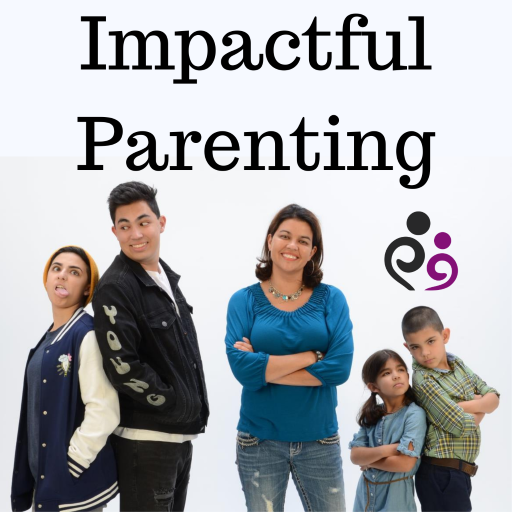
The Impactful Parenting Podcast helps parents turn their chaos into connection with their children. Through meaningful stories, the podcast provides parenting tips for making family life easier! Why? Because school-aged children bring different challenges to parenting that younger kids don’t! The Impactful Parenting Podcast provides help for raising your adolescent child. So if you’re asking yourself questions like: • ”Is this normal?” • ”Why is my teenager doing this?” • ”How do I get my child to stop?” • ”I am so frustrated. What do I do?” • ”Is anyone else experiencing this? I can’t be the only one.” • ”I am worried. What can I do?” Then YOU HAVE FOUND THE RIGHT PLACE! Hi! I am Kristina Campos. I am the founder of the Impactful Parent and my passion is creating better relationships between parents and their children. I am a parenting coach, a teacher who has taught every grade level from Pre-K through high school, and most importantly, I am a mom of 4 kids! (Yep, those are my kiddos in the podcast photo). The teen years don’t need to be difficult. Teenagers CAN have a special bond with their parents! Listen and discover the tools and techniques you need to create connections, build trust, and have a stress-free household. This is only the beginning! Let’s get started, together! -Kristina Campos Founder of The Impactful Parent
The Impactful Parenting Podcast helps parents turn their chaos into connection with their children. Through meaningful stories, the podcast provides parenting tips for making family life easier! Why? Because school-aged children bring different challenges to parenting that younger kids don’t! The Impactful Parenting Podcast provides help for raising your adolescent child. So if you’re asking yourself questions like: • ”Is this normal?” • ”Why is my teenager doing this?” • ”How do I get my child to stop?” • ”I am so frustrated. What do I do?” • ”Is anyone else experiencing this? I can’t be the only one.” • ”I am worried. What can I do?” Then YOU HAVE FOUND THE RIGHT PLACE! Hi! I am Kristina Campos. I am the founder of the Impactful Parent and my passion is creating better relationships between parents and their children. I am a parenting coach, a teacher who has taught every grade level from Pre-K through high school, and most importantly, I am a mom of 4 kids! (Yep, those are my kiddos in the podcast photo). The teen years don’t need to be difficult. Teenagers CAN have a special bond with their parents! Listen and discover the tools and techniques you need to create connections, build trust, and have a stress-free household. This is only the beginning! Let’s get started, together! -Kristina Campos Founder of The Impactful Parent
Episodes
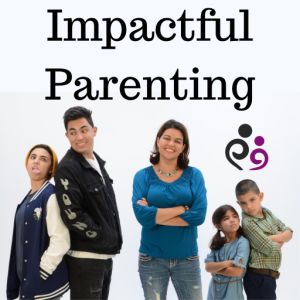
Thursday Dec 02, 2021
133: How To Avoid Power Struggles With Your Child
Thursday Dec 02, 2021
Thursday Dec 02, 2021
Power Struggles: How To Avoid Them With Your Child
Tips for avoiding power struggles with special guest Philip Motts.
===
LINKS MENTIONED IN THE RECORDING Power Struggles
https://theimpactfulparent.com for more FREE Resources and paid programs.
===
Rate, Review, & Subscribe!
"I love Kristina and all the FREE tips that she has to offer! Thank you for making my parenting journey better!" <– If that sounds like you, please consider rating and reviewing my show! This helps me support more people — just like you!!!
Rate with five stars, and select "Write a Review." Then be sure to let me know what you loved most about the episode!
Also, if you haven't done so already, subscribe to the podcast. I'm adding a bunch of bonus episodes to the feed and, if you're not subscribed, there's a good chance you'll miss out. Subscribe now!
What to do next:
- Get The Impactful Parent App! Coming soon! I am so excited! More info to come!
- Follow The Impactful Parenton social media if you don’t already! Facebook, Instagram, LinkedIn, & Pinterest
- Subscribe to the PODCAST
- Check out the official website of The Impactful Parent for FREE RESOURCES, parenting classes, mom’s groups, and so much more! Click here to check it out!
- Discover how you can work with Kristina! Sign up for a FREE 30-minute discovery call! Click here to find a time that works best for you!
Bottom Line... I am here for YOU! Contact me at theimpactfulparent@gmail.com
===
Power Struggles TRANSCRIPT:
Kristina: Welcome, impactful parent. Today we're going to talk about power struggles in our family.
Hello, my name is Kristina Campos. I am the founder of The Impactful Parent. I help parents of school-aged children turn their chaos into connection with their adolescence. I offer free parent education videos every week, online courses, and coaching. If that wasn't enough, I bring experts in on other fields onto The Impactful Parent state to teach you even more.
[caption id="attachment_4565" align="alignright" width="300"] Power Struggles[/caption]
Power Struggles[/caption]
Today I have a special guest. His name is Philip Mott. Philip is a homeschooling dad of three kids. He is a monthly contributor to the magazines The First Time Parent and Fatheringtogether.org. I'm very happy to have him here today to talk about power struggles.
Let's get started right away. I want to ask you, Why do you think that power struggles are so prevalent in family life?
Philip: I think it starts with parental perception. Many parents believe that we are the sole responsibility for bringing up and training our kids. There is a fault in this thinking. When our children defy us, we assume that they don't want to do it with this mentality, so we have to make them do it. This puts us in opposition to their desires, and parents try to force the children through things.
Kristina: From my experience, power struggles stem from the parents wanting to control a little too much. This isn’t necessarily the parents' fault. It usually comes from a place of love, where they just don't like to see their child mess up. They don't want to see the child hurt. They don't want to see the child fail. Coupled with years of being an authority figure and having control over their children in their younger years, it is difficult to change as the child gets older. The tween and teen years start to emerge. Now your adolescent starts to gain independence and wants to break free of the reins of control. The power struggles are amplified.
Philip: Yeah, absolutely. It starts early on when the child starts to develop their own ideas. If we don't approach the child’s new ideas by getting on the same page and working together toward a common goal, the power struggles increase.
Kristina: How would you advise a parent to avoid the struggle of power?
Philip: Let me give you an example of what to do…
Disney parks give their employees special training. They tell their people to always find a way to say YES to the customer. This technique encourages cooperation. So, if your child asks to use your computer and you don’t want to tell them no, you would say something like, “Yes, you can use my computer AFTER I am done with it.” Figuring out how to say yes instead of no is a powerful parenting tool. I think that's a really great way to keep those power struggles at bay.
Kristina: I do the same with my own children. I feel like a lot of parents make the mistake of saying no too quickly. And I know many parents who are listening to this right now are like, yes, it's so simple. It's going to be a lot more difficult than you realize because you're out of practice. But don’t give up, parents! With practice, it should become easier, and you’ll avoid a lot of those power struggles that we’re talking about.
[caption id="attachment_4564" align="alignleft" width="300"] Power Struggles[/caption]
Power Struggles[/caption]
Philip: When you try to say yes to your kids as much as possible, it reminds them that their parents are on their side. We want to help them. We want to be there for them. We aren’t trying to make their life miserable.
Kristina: When you've been in power struggles for a long time, kids forget that you're on their side. They actually get into a routine of being oppositional with you. It becomes a habit and feels natural to them. This isn’t a pattern we want to encourage.
And what if parents can’t change? What are the consequences of keeping the power struggles?
Philip: It's the relationship that we have with our children that is at stake. It's difficult to recover when we start to disrupt the fabric of that relationship and the bond. Parents will start to lose influence in their child’s life. One of the things that are helpful to ask ourselves is, is this helping or hurting the relationship? Am I nagging or criticizing? Am I going to help this relationship, or am I going to hurt the relationship?
Kristina: I think parents underestimate the influence that they have in their child's life. Even as an adolescent, they might be rolling their eyes, but their ears are still open. They may act like they're not listening, but they are. The more that parents can make connections with their kids, the more they can influence their lives.
[caption id="attachment_4563" align="alignright" width="300"] Power Struggles[/caption]
Power Struggles[/caption]
I also believe that some power struggles are rooted in the parents’ upbringing. Suppose the parent grew up in an environment where they had power struggles with their own family. In that case, it feels familiar to have power struggles with their own kids. What do you think about that theory?
Philip: There's a lot of truth to that. I also think it's much bigger than that. Some people grew up learning that the parent is an authoritarian. As an authoritarian, there can be some tendencies to treat children like property or a pet.
Kristina: Now, tell me more about what you do and how people could reach out to you if they resonate.
Philip: Twitter is probably the easiest place to get me. There's a community of other homeschooling moms and dads that I interact with there. That's a good place to connect, and that's where I share most of my content. My handle is @philipmotts1
Kristina: If you would like to become a more impactful parent, check out what my website offers. I have parenting courses, family coaching, 30-day challenges, and lots of free resources. But until next time, you got this, parents. I am just here to help.
===

Thursday Nov 25, 2021
132: Toxic Chemicals All Around Us
Thursday Nov 25, 2021
Thursday Nov 25, 2021
Toxic Chemicals All Around Us
Toxic Chemicals All Around Us That Affect Your Child's Health. Jenna Hua from Million Marker educated the audience about toxic chemicals all around us that affect fertility and our children's health. Discover what these toxins are and HOW to avoid them! Free PDF with video.
LINKS MENTIONED IN THE RECORDING Toxic Chemicals All Around Us
https://theimpactfulparent.com for more FREE Resources and paid programs.
https://theimpactfulparent.com/toxicfree for Million Marker's FREE PACKET
www.millionmarker.com for more from Jenna Hua.
-------------
Rate, Review, & Subscribe!
"I love Kristina and all the FREE tips that she has to offer! Thank you for making my parenting journey better!" <– If that sounds like you, please consider rating and reviewing my show! This helps me support more people — just like you!!!
Rate with five stars, and select "Write a Review." Then be sure to let me know what you loved most about the episode!
Also, if you haven't done so already, subscribe to the podcast. I'm adding a bunch of bonus episodes to the feed and, if you're not subscribed, there's a good chance you'll miss out. Subscribe now!
What to do next:
- Get The Impactful Parent App! Coming soon! I am so excited! More info to come!
- Follow The Impactful Parenton social media if you don’t already! Facebook, Instagram, LinkedIn, & Pinterest
- Subscribe to the PODCAST
- Check out the official website of The Impactful Parent for FREE RESOURCES, parenting classes, mom’s groups, and so much more! Click here to check it out!
- Discover how you can work with Kristina! Sign up for a FREE 30-minute discovery call! Click here to find a time that works best for you!
Bottom Line... I am here for YOU! Contact me at theimpactfulparent@gmail.com
---------
Toxic Chemicals All Around Us TRANSCRIPT:
Kristina: Welcome. Today, we will talk about the hidden TOXINS all around and how families can live a more toxic-free lifestyle. Hello, my name is Kristina Campos. I am the founder of The Impactful Parent. I help parents of school-aged children turn their chaos into connection with their adolescence. I offer free parent education videos every week, online courses, and coaching. And if that wasn't enough, I bring experts in other fields onto The Impactful Parent stage to teach you even more, and today I have a special guest. Her name is Dr. Jenna Hua. And Jenna is the founder of a company called Million Marker. It's a company that empowers people to detox environmental toxins out of their lives and educates the public on harmful chemicals from plastics and everyday products that affect health. I'm really excited to have Jenna on today. This is an amazing episode you do not want to miss.
[caption id="attachment_4543" align="alignright" width="300"] Toxic Chemicals[/caption]
Toxic Chemicals[/caption]
Jenna: Thank you, Kristina.
Kristina: I want to start off with, Where are these toxins that you're talking about?
Jenna: So they're actually everywhere. I don’t want to overwhelm your audience, but they are everywhere. It could be coming from the air you breathe, the food you eat, or the products you use. They're pretty much all around us. There are over 80,000 chemicals in use today, and only 1% of them have sufficient safety data. I think it's important for people to be aware and to avoid these chemicals whenever possible. They are affecting your health. But you can’t avoid what you don’t know, so awareness of these chemicals is step one. These chemicals have no business being in our bodies. They only do harm. They don't do any good.
Kristina: Can you tell me the top harmful chemicals that parents need to know about and where we can find those chemicals?
Jenna: There are several classes of these chemicals. Most have heard about heavy metal, right? We know about arsenic in rice. So you want to make sure that you wash your rice multiple times. This will decrease the arsenic content of the rice.
When you think about heavy metal, you think about mercury, right? Mercury frequently is found in fish. Always check your local fisheries if the mercury level is high. If the mercury is high, try not to consume as much. If you're pregnant or thinking about getting pregnant, it is even more important to limit exposure.
Another class is pesticides. Pesticides occur in fruits and vegetables. So always wash your vegetables. And if you can consume organic, always choose organic over inorganic.
Home cleaning products is another place to pay special attention to. There are three kinds of chemicals in these products that are pretty significant. People probably have heard about BPA. BPA is in plastic and can show up on thermal receipts. If you go to a gas station or supermarket, the receipt’s ink and coating could have BPA. If you touch it, you will get exposed. Instead, we always tell people to not touch the receipt. If you absolutely have to touch it, make sure you wash your hands after. BPA also occurs on the lining of canned foods and canned drinks. So limit the consumption of canned food.
With new BPA laws, manufacturers must label their product BPA-free. But they changed the formula to BPS and BPF. They literally can keep changing the name until Z. It is just too difficult for policymakers to actually keep up with this kind of regulation. We tell people to avoid plastic as much as possible. BPA is also in wraps and food packaging. They can also occur in personal care products.
Then look out for parabens. Parabens are used as preservatives in personal care products. All these chemicals that I talked about are called hormone-disrupting chemicals.
[caption id="attachment_4545" align="alignleft" width="300"] Toxic Chemicals[/caption]
Toxic Chemicals[/caption]
And then the last class is called benzo fino. You can find this chemical in sunblock. This is also the chemical that kills the coral reef. When you buy your sunblock, make sure you buy a sunblock without oxy benzos or phenol.
Kristina: Wow. This is really eye-opening. One of the questions I have for you is about fruits and vegetables. If I eat a fruit peeling off the skin, is it necessary to buy organic? Some people are on a budget, and buying ALL organic can get expensive.
Jenna: That's a good start. However, pesticides are also sprayed on the seed. You will have chemical contamination within the fruit itself. So, consume as much organic as you can. If you buy strawberries, always go organic. Whenever you buy spinach, always go organic. These two are the most heavily contaminated fruits and veggies.
Kristina: What are some of the health impacts of these chemicals?
Jenna: These chemicals are hormone-disrupting because they mess with your hormones, as I mentioned before. Your hormone system actually controls every part of your body. Sleep is actually controlled by your hormones. Fertility is controlled by your hormones. Your metabolism and your mood are controlled by your hormones.
The earlier you get exposed to these chemicals, then the potential detrimental impact you could have. Some other side effects include decreased sperm count and other male fertility-related issues. There is also research linked to conditions like ADHD and kids' IQ.
Kristina: What can parents do to live a more toxic-free lifestyle knowing this new information?
Jenna: Please don't get too overwhelmed because you can literally take small steps to eliminate your exposures.
First, definitely avoid plastics as much as possible. Since avoiding plastics 100% is nearly impossible, be aware that not all plastics are created equal. They are rated on a scale labeled on the bottom of the bottle. So you if you have to use plastic, do NOT use plastics with the numbers 3,4,6 or 7. The numbers 1,2 and 5 are okay. They're better plastic.
[caption id="attachment_4544" align="alignright" width="300"]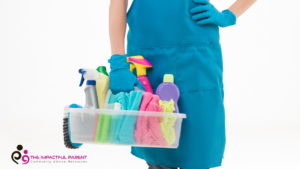 Toxic Chemicals[/caption]
Toxic Chemicals[/caption]
At Million Marker, we have curated a list of good products on our website. Those are vetted by us that they're toxin-free. Another good tip for cooking food is choosing a beeswax wrap rather than typical plastic wrap and never microwave plastic.
I also like to tell people to cook at home as much as possible. Restaurants might use more plastics, buy heavy metal fish, and you just don’t’ know how things are made. Also, purify your water. Use a filter. Lastly, be a mindful shopper. Don't touch receipts and read product ingredient labels.
Kristina: Tell me what you do at Million Marker.
Jenna: At Million Marker, we provide test kits allowing people to understand their toxic chemical exposures. Then, we offer people actionable feedback and tips for change. People can buy a test kit online.
Kristina: That is fantastic. And how long does it take to get results back?
Jenna: Usually two weeks. Then we give you an actionable report. In your report, you will find your levels, how you compare with our existing users, how you compare with the national average, and exactly what you can do. You will also find a whole section on product audits. We identify problematic ingredients that are in your consumption.
Kristina: Tell us where to find out more from Million Marker and tell us about this free PDF that I heard you're giving the audience?
Jenna: You can find us at www.millionmarker.com
The PDF your audience gets today is pretty long. In the packet, you can find how these chemicals will impact your fertility, impacts pregnancy, and if you're planning to conceive, what are the top chemicals you need to avoid. We also have a few things about optimizing your gut health and how these chemicals could impact your gut bacteria. So, check it out.
Kristina: You're going to be able to find that FREE PDF at https://theimpactfulparent.com/toxicfree
And if you would like to become a more impactful parent, please check out all that my website offers. I have parenting courses, family coaching, 30-day challenges, and lots of free resources for parents of school-aged children. But until next time, you got this parents. I’m just here to help.

Thursday Nov 18, 2021
131: Before You Allow Kids On Social Media
Thursday Nov 18, 2021
Thursday Nov 18, 2021
Before You Allow Kids On Social Media: With Dali Rivera gives tips for parents to keep their children safe.
LINKS MENTIONED IN THE RECORDING Before You Allow Kids On Social Media:
https://theimpactfulparent.com for more FREE Resources and paid programs.
www.dalitalks.com for more from Dali
Rate, Review, & Subscribe!
"I love Kristina and all the FREE tips that she has to offer! Thank you for making my parenting journey better!" <– If that sounds like you, please consider rating and reviewing my show! This helps me support more people — just like you!!!
Rate with five stars, and select "Write a Review." Then be sure to let me know what you loved most about the episode!
Also, if you haven't done so already, subscribe to the podcast. I'm adding a bunch of bonus episodes to the feed and, if you're not subscribed, there's a good chance you'll miss out. Subscribe now!
What to do next:
- Get The Impactful Parent App! Coming soon! I am so excited! More info to come!
- Follow The Impactful Parenton social media if you don’t already! Facebook, Instagram, LinkedIn, & Pinterest
- Subscribe to the PODCAST
- Check out the official website of The Impactful Parent for FREE RESOURCES, parenting classes, mom’s groups, and so much more! Click here to check it out!
- Discover how you can work with Kristina! Sign up for a FREE 30-minute discovery call! Click here to find a time that works best for you!
Bottom Line... I am here for YOU! Contact me at theimpactfulparent@gmail.com
----------------
Before You Allow Kids On Social Media TRANSCRIPT:
Kristina: Welcome, impactful parent. Today we're going to talk about things to consider before allowing your child on social media. Hello, my name is Christina compost. I'm the founder of The Impactful Parent. I help parents of school-aged children turn their chaos into connection with their adolescents. I offer free parent education videos every week, online courses, and coaching. If that wasn't enough, I bring experts in their fields onto The Impactful Parent stage to teach you even more. Today I have a very special guest. Her name is Dali Rivera. Dolli teaches parents how to navigate bullying and gives bullying awareness to the masses. She helps parents concerned about their child's safety and has a program called Diversity and Anti-bullying Academy.
Dali: Thank you for having me.
[caption id="attachment_4517" align="alignright" width="300"] Before You Allow Kids On Social Media[/caption]
Before You Allow Kids On Social Media[/caption]
Kristina: What should parents know before allowing their kids to get on social media?
Dali: Oh, this is such a good question. I wish more parents would ask it. First, parents need to consider whether their child is mature enough to handle social media? Your child can encounter inappropriate images and videos, cyberbullying, and this is just the tip of the iceberg. Ask yourself, is my child mature enough to follow the rules?
Kristina: The mistake that parents make is they buy their child a phone. Social media has become an issue, but social media was never aforethought. It is an afterthought.
I'm an advocate of Gabb wireless. This is a phone that has no apps. You cant download social media. It is the best first phone for children. Before introducing social media and apps, I recommend parents test out the responsibility levels of their children having a phone. Period. Without the distractions first. If anyone wants to find out more about Gabb Wireless phones, go to www.gabbwireless.com/promo/IMPACTFULPARENT, and you will even get a discount on your purchase if you use promo code: IMPACTUFULPARENT
Dali, one thing that concerns me with social media is all the personal information distributed with the apps. Some apps even identify a location. This all seems dangerous. Any recommendations for how you block certain activities? How do you keep your child safe in those kinds of scenarios if you're going to allow them to have social media?
[caption id="attachment_4518" align="alignleft" width="300"] Before You Allow Kids On Social Media[/caption]
Before You Allow Kids On Social Media[/caption]
Dali: If you're going to give your child a smart device, then implement monitoring tools. These tools can do anything from block content to give you reports on everything your child is doing on their phone. It is also important to talk to your child about the boundaries and rules of their devices BEFORE you get them. Tell your child that you will monitor their phone and request to see it from time to time. Know your child’s passwords and set up expectations early.
One of the things that I'm seeing is children's identities being stolen because they unintentionally give out information. Patient preditors will watch posts closely and even piece-mill private information together until they have enough private information that they can steal someone’s identity. All your child has to do is accidentally record a video with your house number in the background or something similar.
Kristina: Social media also opens up the door to another type of bullying. If your child is bullied online, what should parents do? Do social media companies do anything about this?
Dali: That's a great question. I think most people know nothing happens. I mean, Facebook, Instagram, they're so huge that they can't help. When you report something, it might take months for them to give you a one-sentence answer. That's it. In the meantime, you're waiting and wondering, are they going to attack me again? Are they going to unblock them, and then they're going to come back and retaliate? Instead, take a screenshot before you report them or before you block them. You want to collect evidence of what happened. You need to have evidence. Not all police departments have a cyberbullying Task Force.
Don’t expect the school to help either. Sometimes the school feels non-responsible to help because the activities happen outside of school hours and off-campus. Other times, the schools don’t have the resources to help either.
The laws have not caught up with how bullying of all types is happening.
[caption id="attachment_4519" align="alignright" width="300"] Before You Allow Kids On Social Media[/caption]
Before You Allow Kids On Social Media[/caption]
Kristina: Are there any tools that parents can use to keep their children safe online?
Dali: Yes, there are so many tools out there. For example, the phone you just mentioned. Go get a Gabb Wireless phone first and test the waters for maturity and responsibility. Don't start with a smartphone. Also, use monitoring tools. They're very powerful. Net Nanny is a good one. Bark and Kids Locks are also great. Some of these tools block everything and give you super detailed information like transcribing their text messages. Others are less invasive. You got to do your research and pick out one that will be the best for your family.
Don't talk to your kids about online safety only when you get a phone. Do it repeatedly. Keep it in their head, fresh all the time so that they're aware. It's something that you need to continuously work on.
Kristina: And I hear that you do give free consultations to the audience, is that right?
Dali: That's true. Yes, I do. You can book a free 30-minute consultation at www.dalitalks.com
Kristina: Thank you, Dali! Parents, contact Dali for all your bullying needs. But, until next time, we are just here to help!
----------------
It takes a lot to run a business and family! Here are a few products I recommend:
Gabb Wireless: The BEST first phone for your child!
- No internet, no social media, and NO WORRIES! This phone has GPS tracking and other features that parents want to have peace of mind about their child having a phone. The Gabb Wireless phone has the sleek look of a smartphone that kids love without worry and high price. To find out more and order your phone (or watch) go to: gabbwireless.com/promo/IMPACTFULPARENT30
The Contract Shop
- Protect your contact and your business with the Contract Shop. The Contract Shop provides DIY legal contracts that you customize for your business and your business needs. Contracts are important and legal documents are boring! The Contract Shop provides the security you need without the big price tags of an expensive law firm. Try it out today and please use my affiliate link for referring you because I get a small kickback for recommending The Contract Shop products. Here is your link: https://thecontractshop.com?ref=kristinacampos
Mobile Monkey
- Mobile Monkey helps you gain more engagement in your social media posts by providing you with a ROBOT to client questions in your DM. This bot is genius and saves so much time! Use your robot to respond to common questions, to create keywords your audience can type in order to receive special links, get analytics, auto-responses and so much MORE! Mobile Monkey should be helping every content creator’s business because at this low price- there are no excuses for getting more time, ease in your business, and increased engagement! Please use my affiliate link to order: https://app.mobilemonkey.com/instachamp?a_aid=kristinaann

Thursday Nov 11, 2021
130: Get Out Of Survival Mode
Thursday Nov 11, 2021
Thursday Nov 11, 2021
Get Out Of Survival Mode
Getting Out Of Overwhelm with Lindsey Peterson talks about how parents can stop the chaos and come to a place of calm to be a more impactful parent!
LINKS MENTIONED IN THE RECORDING Get Out Of Survival Mode :
https://theimpactfulparent.com for more FREE Resources and paid programs.
https://theimpactfulparent.com/20waystocope for The Impactful Parent's coping strategies
https://theresponsivewoman.com for more from Lindsey
----------
Rate, Review, & Subscribe!
"I love Kristina and all the FREE tips that she has to offer! Thank you for making my parenting journey better!" <– If that sounds like you, please consider rating and reviewing my show! This helps me support more people — just like you!!!
Rate with five stars, and select "Write a Review." Then be sure to let me know what you loved most about the episode!
Also, if you haven't done so already, subscribe to the podcast. I'm adding a bunch of bonus episodes to the feed and, if you're not subscribed, there's a good chance you'll miss out. Subscribe now!
What to do next:
- Get The Impactful Parent App! Coming soon! I am so excited! More info to come!
- Follow The Impactful Parenton social media if you don’t already! Facebook, Instagram, LinkedIn, & Pinterest
- Subscribe to the PODCAST
- Check out the official website of The Impactful Parent for FREE RESOURCES, parenting classes, mom’s groups, and so much more! Click here to check it out!
- Discover how you can work with Kristina! Sign up for a FREE 30-minute discovery call! Click here to find a time that works best for you!
Bottom Line... I am here for YOU! Contact me at theimpactfulparent@gmail.com
----------
Getting Out Of Survival Mode TRANSCRIPT:
Kristina: Welcome, parents. Today we're going talk about how to get out of survival mode in our parenting. Hello everyone. My name is Kristina Campos. I'm the founder of The Impactful Parent. I help parents of school-aged children turn their chaos into connection with their adolescents. I offer free parent education videos every week. I offer online courses and coaching. If that wasn't enough, I bring experts in other fields onto The Impactful Parent stage to teach us even more. Today I have a special guest, Lindsey Peterson. Lindsey teaches women how to have more energy and be less overwhelmed when it comes to daily living. Thank you for being here, Lindsey.
Lindsey, I want to start off with what does survival mode looks like? How do I know if I am in survival mode?
Lindsey: We're crabby, we're overwhelmed, we're tired, and we're exhausted. We're finding ourselves snapping at the littlest of things. Suddenly, our child might say, Mom, stop yelling. It's not fun. And we're surely not being that role model that we want to be for our kids.
[caption id="attachment_4480" align="alignright" width="300"] Getting Out Of Survival Mode[/caption]
Getting Out Of Survival Mode[/caption]
Kristina: No, we don't want to be in survival mode. We want to feel good. And when we feel good, we're better parents. So tell us, Lindsey, how can I get out of survival mode if I find myself that I'm there?
Lindsey: Start to build awareness of when you are in survival mode. Look for a fight response or flight response, or freeze response.
The fight response looks like we're yelling, screaming, or raising our voices.
The flight mode response feels like you want to give up. No more of this.
And the freeze response has you stuck. Mom? Mom? Are you there? You're stuck there speechless. Or you don't know what to do. You don't know what to say. You don't know how to act.
Then how do you get out of survival mode once you realize you are experiencing a fight, flight, or freeze response? You have to create calm. Calm is the secret to getting out.
Kristina: Can you teach me a calming strategy to get out of survival mode?
Lindsey: Yep. Absolutely. One of my favorite strategies to use is stomach breathing. There is a difference between lung breathing and stomach breathing.
[caption id="attachment_4479" align="alignright" width="300"] Getting Out Of Survival Mode[/caption]
Getting Out Of Survival Mode[/caption]
To start, put one hand on your chest and one hand over your stomach. Take some intentional breaths. Notice where your breath is right now. Close your eyes and notice where your breath is? Is it in your lungs, or is it in your stomach?
Often, our breath is in our lungs because we've got things going on, we're busy. We're feeling overwhelmed or nervous. When we feel like this, our breath comes from our lungs. I want you to shift your breath from your lungs to your stomach. Intentionally telling your breath to shift to your stomach. Once your breath I coming from your stomach, take three deep breaths.
Lung breath is actually a survival breath. When we are in a true survival situation, we breathe from our lungs. That breath keeps us alert. The stomach breathe does the opposite. The stomach breathe calms us down.
Kristina: What happens if we just tried that and it didn't work?
Lindsey: Don't use it. There are lots and lots of calming strategies out there. Simply find one that works for you. I have plenty more I can teach you, or you can grab them off my website.
Kristina: I also have a FREE PDF called 20 Ways To Cope. On there, I give you more than 20 ways to calm down and ways to cope with anxiety and frustration. It is meant for kids, but honestly, it can work for adults too. You never know what will work for you, so it is important to try several techniques and see what works best. You can get my free pdf at https://theimpactfulparent.com/20waystocope
[caption id="attachment_4478" align="alignleft" width="300"] Getting Out Of Survival Mode[/caption]
Getting Out Of Survival Mode[/caption]
Lindsey: Yes, and just because a technique works well for one person doesn’t mean it will work well for you or well for your child.
Kristina: Tell us more about what you do, Lindsay, in case people want to reach out to you for more.
Lindsey: I start off by helping moms get out of survival mode. Then I work with mom to stay out of survival mode. I teach you tools and strategies to keep you happy, healthy, and balanced.
Kristina: Thank you for being here today. Lindsey, there is so much that you can offer other women, and I so appreciate that.
And if you would like to become a more impactful parent or listener, check out all that my website offers. I have parenting courses, family coaching, 30 Day challenges, and lots of free resources. But Until next time, you got this, parents. I'm just here to help.
-----------
It takes a lot to run a business and family! Here are a few products I recommend:
Gabb Wireless: The BEST first phone for your child!
- No internet, no social media, and NO WORRIES! This phone has GPS tracking and other features that parents want to have peace of mind about their child having a phone. The Gabb Wireless phone has the sleek look of a smartphone that kids love without worry and high price. To find out more and order your phone (or watch) go to: gabbwireless.com/promo/IMPACTFULPARENT30
The Contract Shop
- Protect your contact and your business with the Contract Shop. The Contract Shop provides DIY legal contracts that you customize for your business and your business needs. Contracts are important and legal documents are boring! The Contract Shop provides the security you need without the big price tags of an expensive law firm. Try it out today and please use my affiliate link for referring you because I get a small kickback for recommending The Contract Shop products. Here is your link: https://thecontractshop.com?ref=kristinacampos
Mobile Monkey
- Mobile Monkey helps you gain more engagement in your social media posts by providing you with a ROBOT to client questions in your DM. This bot is genius and saves so much time! Use your robot to respond to common questions, to create keywords your audience can type in order to receive special links, get analytics, auto-responses and so much MORE! Mobile Monkey should be helping every content creator’s business because at this low price- there are no excuses for getting more time, ease in your business, and increased engagement! Please use my affiliate link to order: https://app.mobilemonkey.com/instachamp?a_aid=kristinaann

Thursday Nov 04, 2021
129: Sibling Sexual Abuse Awareness
Thursday Nov 04, 2021
Thursday Nov 04, 2021
Sibling Sexual Abuse Awareness Episode:
Jane Epstein comes onto the Impactful Parent stage and tells her story of sibling sexual abuse. This silent epidemic is rarely talked about publicly, but many families need support. Jane Epstein provides the Impactful Parent audience education, awareness, and resources for help in this very important episode.
LINKS MENTIONED IN THE RECORDING Sibling Sexual Abuse:
https://theimpactfulparent.com for more FREE Resources and paid programs.
https://theimpactfulparent.com/siblingsexualabuse for Jane's resources
www.complicatedcourage.com for Jane's website
---------------
Rate, Review, & Subscribe!
"I love Kristina and all the FREE tips that she has to offer! Thank you for making my parenting journey better!" <– If that sounds like you, please consider rating and reviewing my show! This helps me support more people — just like you!!!
Rate with five stars, and select "Write a Review." Then be sure to let me know what you loved most about the episode!
Also, if you haven't done so already, subscribe to the podcast. I'm adding a bunch of bonus episodes to the feed and, if you're not subscribed, there's a good chance you'll miss out. Subscribe now!
What to do next:
- Subscribe to The Impactful Parent Newsletter so you won’t miss a parenting tip that can help you! This once-a-week newsletter comes out Sunday mornings, and you can unsubscribe at any time. No obligation. No Spam. Just your favorite parenting tips! Newsletter sign-up link is here.
- Follow The Impactful Parenton social media if you don’t already! Facebook, Instagram, LinkedIn, & Pinterest
- Subscribe to the PODCAST and/or the YOUTUBE CHANNEL! Podcast link & YouTube link
- Check out the official website of The Impactful Parent for FREE RESOURCES, parenting classes, mom’s groups, and so much more! Click here to check it out!
- Discover how you can work with Kristina! Sign up for a FREE 30-minute discovery call! Click here to find a time that works best for you!
Bottom Line... I am here for YOU! Contact me at theimpactfulparent@gmail.com
------------------------
Sibling Sexual Abuse Awareness TRANSCRIPT:
Kristina: Welcome to The Impactful Parent. Today we're going to talk about a silent epidemic that's happening around the world. It is sibling sexual abuse. In today's episode, I'd like to bring awareness to the silent epidemic and give you prevention tips. Hello, my name is Kristina Campos. I'm the founder of The Impactful Parent, and welcome to my Inspire and Learn series, where real parents come on and tell their story of inspiration and learning because a wise man learns from his mistakes. Still, a wiser man learns from other people's mistakes. Today we're going to learn from our guest Jane Epstein. Jane is a sibling sexual abuse survivor and advocates who speaks about tools parents can use for prevention and victims can use for recovery. I'm happy to have her on the show today. Thank you for being here, Jane.
Jane: Thank you so much for having me, and thank you to your guests who are listening.
Kristina: Jane, I want to talk about your story first. Would you mind telling us about what happened to you?
Jane: I'm going to give you the shortened version of my story. My story happens out of order because my life kind of happened out of order. That's the easiest way to describe it. When I was about 45 years old, I found myself incredibly depressed, and I was sitting at the bottom of the staircase holding my eight-year-old son's hand. I wanted to tell him, I'm sorry, I failed you as a mother. Because I had that sense of dread rising into my chest, I felt like my life was coming to an end. Turns out that was depression. It was at that moment that I decided I needed to figure out what was going on. Why am I so unhappy? I'm married. I have two children, I should be happy.
[caption id="attachment_4454" align="alignright" width="300"] sibling sexual abuse awareness[/caption]
sibling sexual abuse awareness[/caption]
I started writing my story down from the start until the present day. I realized that I had been sexually abused from age six until 12 by an older sibling when I started doing that. After that, I became promiscuous, and I became so promiscuous that I became a stripper. Being a stripper actually gave me power. I felt pretty, and I learned how to talk to men. It doesn't happen often, but I met my first husband stripping. He was actually a patron in the club. He came up, and he tipped me and said, “What are you doing here? You look like the kind of girl I can take home to meet my mom.” And he did just that. I did meet his mom, and we were married. We actually had a really nice love affair, but at some point, I started resenting him because I wasn't known inside. I didn't understand that, but he didn't know the real me. He didn't know the shame I held. I started resenting him, and I started pushing him away.
Then my husband was diagnosed with terminal cancer. When he died, I felt for the first time. I'd spent 40 years hiding and being numb. With his death, I couldn't avoid the pain.
To my surprise, I got remarried and had two small children. That's when the memories came back of the sexual abuse, and that's when I ended up depressed at the beginning of my story. I ended up having to turn inward and discover what was going on inside of me that needed to be addressed to move forward.
Kristina: That's an amazing journey. I don't feel like it's unusual. Sexual abuse memories can get suppressed and then come back later in life when something triggers it. I'm glad that you found where you are now and are helping others. Thank you for doing that.
Jane: Thank you. I feel very fortunate to have come to this part of my life where I can give back.
Kristina: Let's talk a little bit about sibling sexual abuse. How likely is this to happen in families?
Jane: Sibling sexual abuse includes step siblings, cousins, and older adolescents. So think about your child's best friend's older brother or sister. In fact, 35 to 40% of child sexual abuse is estimated to be perpetrated by juveniles. So it is a silent epidemic and is happening. We just aren't talking about it.
[caption id="attachment_4455" align="alignleft" width="300"] sibling sexual abuse awareness[/caption]
sibling sexual abuse awareness[/caption]
Kristina: I want to identify the difference between normal child curiosity versus sexual abuse. Can you make that difference for the audience?
Jane: It's a very confusing aspect of sibling sexual abuse and part of the reason it's hidden so well. Children are curious. Absolutely. Curiosity is between children the same size, same age, and at the same developmental level. Curiosity is exploratory and spontaneous. Think of two children giggling and playing doctor once or twice. The behavior stops after a couple of times or after a parental intervention. Sexual abuse occurs when the children are at different ages, sizes, and developmental levels. Sexual abuse is hidden. It's behind closed doors, and the motivation is sexual gratification or power.
Kristina: I want to make things clear that the older child may not have malicious intentions. They really could be curious, but their actions are still considered abuse because of the age difference.
Jane: That is correct. Often their motives start as curiosity but evolve into abuse, as in my situation. I had an older sibling who was curious, started touching me, and it went on for six years because their body reacts the way it's supposed to react.
Kristina: What are the factors that lead to sibling sexual abuse?
Jane: There's not just one thing that can lead to it, but I will walk you through a couple scenarios. The first is a lack of body safety education. It’s important to read books to your child about body safety, boundaries, the right to say no, and kids knowing the correct terms for private parts.
Second, educate your 10-13-year-old about sex, puberty, and their changing body. Kids are going to have questions. They're going to want to find answers. You want your child to be comfortable going to you for help and not seek out a younger sibling or a younger cousin or the internet for those answers.
[caption id="attachment_4456" align="alignright" width="300"] sibling sexual abuse awareness[/caption]
sibling sexual abuse awareness[/caption]
Third, watch out that your child isn’t exposed to pornography. Sometimes avoiding pornography is impossible because your child will stumble upon it by accident. We need to educate our children about pornography.
Kristina: Awareness is my primary goal today. Many parents don’t even know this exists. You can’t prevent something you don’t know anything about. I am grateful you are making everyone aware. It can’t be easy to tell your story.
Jane: It is very difficult to talk about. When I first started coming forward with my story, I started Googling ‘sibling sexual abuse.’ Google was almost silent. I thought, well, I can't be the only one. So I started coming forward with my story. I had survivors reaching out to me, saying thank you for talking about this. Then I started having parents reaching out to me, saying this happened in their family. Today, I have four or five people reach out to me daily. This silent epidemic destroys families. But, I truly believe that we can put a dent in the numbers if we educate our children and if we educate ourselves.
Kristina: What are the signs of sibling sexual abuse so parents can look out for it in their homes?
Jane: There's one thing I do want to share. First and foremost is that approximately 40% of children who are sexually abused show no signs. 40% show no signs! That's why I feel prevention is in education.
Parents, you know your kids best. Kids don't generally change for no reason overnight. If there's unexplained anger or all of a sudden they don't want to go to someone's house, or they're wetting the bed, then consider this as a possible cause.
Kristina: These kids need help. Both the abuser and the person that got abused need help. Where can parents find help?
Jane: I am a full-time advocate. I have lots of websites and resources on my site. I'm not making any money from this. I'm just bringing about awareness. To start, I have a FREE PDF for your audience they can download with a list of resources.
Kristina: To get that FREE PDF of resources, you can go to https://theimpactfulparent.com/siblingsexualabuse, and Jane’s website is www.complicatedcourage.com
Jane: I want to tell your audience that you are not alone if they are victims or a parent of sibling sexual abuse. Get help. You are not alone, and there is help for you.
Kristina: Jane, thank you so much.
If you have an inspiring story and want to share your story with The Impactful Parent community so that others can learn from you, please go to https://theimpactfulparent.com/work-with-me and sign up.
You can also become a more impactful parent by checking out all that my website has to offer. I have parenting courses, family coaching, 30-day challenges, and lots of free resources. But until next time, you got this, parents. I am just here to help.
---------------------
It takes a lot to run a business and family! Here are a few products I recommend:
Gabb Wireless: The BEST first phone for your child!
- No internet, no social media, and NO WORRIES! This phone has GPS tracking and other features that parents want to have peace of mind about their child having a phone. The Gabb Wireless phone has the sleek look of a smartphone that kids love without worry and high price. To find out more and order your phone (or watch) go to: gabbwireless.com/promo/IMPACTFULPARENT30
The Contract Shop
- Protect your contact and your business with the Contract Shop. The Contract Shop provides DIY legal contracts that you customize for your business and your business needs. Contracts are important and legal documents are boring! The Contract Shop provides the security you need without the big price tags of an expensive law firm. Try it out today and please use my affiliate link for referring you because I get a small kickback for recommending The Contract Shop products. Here is your link: https://thecontractshop.com?ref=kristinacampos
Mobile Monkey
- Mobile Monkey helps you gain more engagement in your social media posts by providing you with a ROBOT to client questions in your DM. This bot is genius and saves so much time! Use your robot to respond to common questions, to create keywords your audience can type in order to receive special links, get analytics, auto-responses and so much MORE! Mobile Monkey should be helping every content creator’s business because at this low price- there are no excuses for getting more time, ease in your business, and increased engagement! Please use my affiliate link to order: https://app.mobilemonkey.com/instachamp?a_aid=kristinaann

Thursday Oct 28, 2021
127: Controlling YOUR Emotions To Be A Better Parent
Thursday Oct 28, 2021
Thursday Oct 28, 2021
Controlling YOUR Emotions To Be A Better Parent with Cristina Moise. This episode gives tips to parents for controlling their emotions and why it is an important part of good parenting.
LINKS MENTIONED IN THE RECORDING Emotional Self Regulation: Controlling your emotions to be a better parent :
https://theimpactfulparent.com for more FREE Resources and paid programs.
--------
Rate, Review, & Subscribe!
"I love Kristina and all the FREE tips that she has to offer! Thank you for making my parenting journey better!" <– If that sounds like you, please consider rating and reviewing my show! This helps me support more people — just like you!!!
Rate with five stars, and select "Write a Review." Then be sure to let me know what you loved most about the episode!
Also, if you haven't done so already, subscribe to the podcast. I'm adding a bunch of bonus episodes to the feed and, if you're not subscribed, there's a good chance you'll miss out. Subscribe now!
What to do next:
- Subscribe to The Impactful Parent Newsletter so you won’t miss a parenting tip that can help you! This once-a-week newsletter comes out Sunday mornings, and you can unsubscribe at any time. No obligation. No Spam. Just your favorite parenting tips! Newsletter sign-up link is here.
- Follow The Impactful Parenton social media if you don’t already! Facebook, Instagram, LinkedIn, & Pinterest
- Subscribe to the PODCAST and/or the YOUTUBE CHANNEL! Podcast link & YouTube link
- Check out the official website of The Impactful Parent for FREE RESOURCES, parenting classes, mom’s groups, and so much more! Click here to check it out!
- Discover how you can work with Kristina! Sign up for a FREE 30-minute discovery call! Click here to find a time that works best for you!
Bottom Line... I am here for YOU! Contact me at theimpactfulparent@gmail.com
-------------
Transcript for Controlling YOUR Emotions To Be A Better Parent.
Kristina: Welcome impactful parents. Today we are going to talk about how to balance yourself emotionally as a parent.
Hello, my name is Kristina Campos. I'm the founder of The Impactful Parent. Today we have a special guest Cristina Moise. Cristina is the founder of Refresh Your Mind. She guides parents to overcome anxiety and become emotionally balanced to be better parents. Thank you for being here, Cristina.
Cristina: Thank you.
Kristina: Parenting is full of overwhelm! I feel like I'm overwhelmed about 90% of my day! So how can parents manage the overwhelm in their life?
[caption id="attachment_4402" align="alignright" width="300"] Controlling YOUR Emotions To Be A Better Parent[/caption]
Controlling YOUR Emotions To Be A Better Parent[/caption]
Cristina: My first suggestion is to take time for yourself. I know this is difficult. I also suggest you write down everything you think you need to do. What you will notice is, as you reflect on your to-do list, things will become clear. The list will look manageable, or you will find things you can cross off and do later. You can also prioritize items and others you can put at the bottom of the list.
Next, examine the list and consider items you can delegate to others. Don’t be afraid to ask for help or support.
Kristina: Parents should delegate tasks to their children. For example, if your child is old enough to do laundry. Then have them do their own laundry. Period. If they aren’t old enough yet, then parents should be teaching their children to do laundry. Small children love to be helpers, and I teach my kids from a very young age to help me fold clothes and separate clothes by color.
Another emotion common amongst parents is anxiety. What are some tips for overcoming anxiety?
Cristina: Anxiety is nothing more than fear about the future. Ask yourself, what is the successful outcome that I want? Imagining a success-based scenario is what will help you through the anxious times. Our projections about the future are very much based on our experiences from the past. To overcome our bad past experiences, parents need to have several good counteracting good experiences and a mindset shift focusing on the positive.
[caption id="attachment_4400" align="alignleft" width="300"] Controlling YOUR Emotions To Be A Better Parent[/caption]
Controlling YOUR Emotions To Be A Better Parent[/caption]
Kristina: Children have a special knack for pushing our buttons. They trigger our emotions and bring up our unresolved feelings from our past.
Cristina: Yes! Children remind us that there's something that needs to change. There is some unresolved business or emotions from our past that is not fully released and need attention. To be honest, I thought that parenting was all about educating our children. I was wrong. Instead, children teach the parents more about themselves. Parenting forces many people to readdress their past feelings and get closure so they can move forward.
Kristina: I couldn't agree more. There is nothing like parenting, to bring up all the stuff from your past that you didn't even know bothered you. Give yourself grace. Everybody has things that they're going to have to deal with. Good parents will reexamine those deep-seated emotions and grow from their experiences. Each generation, hopefully, gets more perspective and improves themselves.
[caption id="attachment_4399" align="alignleft" width="300"] Controlling YOUR Emotions To Be A Better Parent[/caption]
Controlling YOUR Emotions To Be A Better Parent[/caption]
Cristina: Parents naturally want to ignore or suppress the negative emotions that parenting will drag up. This is natural, but we have to resist surpassing the emotions. Instead, we need to deal with those emotions to release them. Negative emotions are actually good. Yes, they are uncomfortable, but the truth is, we will get the biggest growth and the biggest learnings from these emotions. Uncomfortable negative emotions are like someone knocking on your door. It is something saying to you that something requires your attention. Let go of your negative emotions from your past. Many learnings, new information, and new perspectives about yourself can develop from addressing the root of your emotions.
Kristina: Thank you for talking with me, Cristina. Parents need to self-examine their emotions and curate some self-love. Too often, parents only focus on the children and keeping the children happy. Still, it is just as important to care for ourselves, so we can be better parents.
And if anyone in the audience wants to become a more impactful parent, check out my website. I have parenting courses, family coaching, 30-day challenges, and lots of free resources for you and your school-aged child. But until next time, you got this, parents. I am just here to help.
----------------------------
It takes a lot to run a business and family! Here are a few products I recommend:
Gabb Wireless: The BEST first phone for your child!
- No internet, no social media, and NO WORRIES! This phone has GPS tracking and other features that parents want to have peace of mind about their child having a phone. The Gabb Wireless phone has the sleek look of a smartphone that kids love without worry and high price. To find out more and order your phone (or watch) go to: gabbwireless.com/promo/IMPACTFULPARENT30
The Contract Shop
- Protect your contact and your business with the Contract Shop. The Contract Shop provides DIY legal contracts that you customize for your business and your business needs. Contracts are important and legal documents are boring! The Contract Shop provides the security you need without the big price tags of an expensive law firm. Try it out today and please use my affiliate link for referring you because I get a small kickback for recommending The Contract Shop products. Here is your link: https://thecontractshop.com?ref=kristinacampos
Mobile Monkey
- Mobile Monkey helps you gain more engagement in your social media posts by providing you with a ROBOT to client questions in your DM. This bot is genius and saves so much time! Use your robot to respond to common questions, to create keywords your audience can type in order to receive special links, get analytics, auto-responses and so much MORE! Mobile Monkey should be helping every content creator’s business because at this low price- there are no excuses for getting more time, ease in your business, and increased engagement! Please use my affiliate link to order: https://app.mobilemonkey.com/instachamp?a_aid=kristinaann

Tuesday Oct 26, 2021
128: Stop The Nagging. Create A Routine.
Tuesday Oct 26, 2021
Tuesday Oct 26, 2021
Stop The Nagging. Create A Routine.
Stop the Nagging. Create a ROUTINE. In this episode, discover why routine is important for children of all ages and how you can create a routine for your child to be successful.
Stop Nagging. Create a Routine. Links in Episode 👇
- More from The Impactful Parent https://theimpactfulparent.com
----------------
Rate, Review, & Subscribe!
"I love Kristina and all the FREE tips that she has to offer! Thank you for making my parenting journey better!" <– If that sounds like you, please consider rating and reviewing my show! This helps me support more people — just like you!!!
Rate with five stars, and select "Write a Review." Then be sure to let me know what you loved most about the episode!
Also, if you haven't done so already, subscribe to the podcast. I'm adding a bunch of bonus episodes to the feed and, if you're not subscribed, there's a good chance you'll miss out. Subscribe now!
What to do next:
- Subscribe to The Impactful Parent Newsletter so you won’t miss a parenting tip that can help you! This once-a-week newsletter comes out Sunday mornings, and you can unsubscribe at any time. No obligation. No Spam. Just your favorite parenting tips! Newsletter sign-up link is here.
- Follow The Impactful Parenton social media if you don’t already! Facebook, Instagram, LinkedIn, & Pinterest
- Subscribe to the PODCAST and/or the YOUTUBE CHANNEL! Podcast link & YouTube link
- Check out the official website of The Impactful Parent for FREE RESOURCES, parenting classes, mom’s groups, and so much more! Click here to check it out!
- Discover how you can work with Kristina! Sign up for a FREE 30-minute discovery call! Click here to find a time that works best for you!
Bottom Line... I am here for YOU! Contact me at theimpactfulparent@gmail.com
--------------------
Transcript for Stop Nagging. Create a Routine.
Welcome Impactful Parents. Today we are going to talk about how to create a routine for your school-aged child.
Hello, my name is Kristina Campos. I am the founder of the Impactful Parent. Every week I come on and answer one of your questions LIVE. If you have a question for next week, please submit it at theimpactfulparent@gmail.com or by messaging me on social media. All submissions are kept anonymous.
Today’s question reads: When our kids are babies, everyone tells you how important routine is for them. What about when your child is elementary school age? Or Middle school? Does routine become less important as children get older, and what does it look like beyond the toddler years?
[caption id="attachment_4441" align="alignright" width="300"] Stop Nagging[/caption]
Stop Nagging[/caption]
Thank you for submitting this question! Today I will tell you why routine is important for your child at all developmental stages, and stick around to the end because I am giving you tips for creating a routine to be a more impactful parent. Let’s get started!
First of all, routine is incredibly important for your school-aged child because of 3 main things: Routine provides security, helps with behavior problems, and teaches growing adolescents time management skills. (Among other awesome benefits too.)
When children or adolescents have a routine, they feel more secure about their environment. There is predictability in their day, and this, in turn, makes them less anxious and reduces stress. It might sound silly, but routine creates the security that kids need to feel safe with you. You aren’t this unpredictable creature that will throw something unexpected at them that they can’t handle or that they don’t like. Routine makes kids feel safe. When you establish a routine with your child, you will also create a bond with them that a chaotic and disruptive household simply does NOT have.
Routine also alleviates many behavior problems that can arise, especially as your child gets older into their teen years and wants to assert their independence. Routine is the foundation for making your expectations clear and known. Once you need your child to do a certain task, for example, clean their room or do their homework, parents should set up a particular time and day for their child to accomplish the expectation. When a task becomes routine instead of sporadic, it doesn’t feel like a chore for the child to accomplish because it is simply part of their day. Parents will also get less push-back, arguments, and it increases the likelihood of your child being successful.
[caption id="attachment_4442" align="alignright" width="300"] Stop Nagging[/caption]
Stop Nagging[/caption]
Lastly, the third reason you want to implement a routine in your house is to teach your child to become a responsible adult. Yep, routine teaches children time management skills and basic work skills to get things done. As they become middle school and high school students, this is increasingly more important, as their workload gets bigger. They have to learn to multi-task activities. Routine teaches kids responsibility and prioritization.
So how do parents implement routines in their homes? Well, start by writing down everything you want your child to do every day and every week. Make a list of activities and find a time and day for each thing. The hardest part of a routine is not making these lists and choosing the time. The difficult part is creating stability and consistency for your child. This is where most parents falter. Things come up, and life gets busy, but just like when your child was a baby, and you had to rearrange your day around nap time, parents of school-aged children need to prioritize the routine in their home. Yes, you’ll need to inconvenience your own schedule, needs, and wants for the greater good of your child’s routine. It sucks, I know, but it is important. For example, if you want your child to do their homework with integrity, you need to provide the space for your child to succeed. It is difficult for growing brains who don’t have the executive functioning skills to do their homework at random times and in different locations. Kids need consistency and routine to be the most successful. This goes for any task that you want your child to do on an ongoing basis. Let’s take, for example, bedtime. Many parents don’t give their teens a bedtime routine. Why? Well, they feel like they are old enough to bathe, brush their teeth, and put themselves to sleep. A consistent bedtime routine will help your child keep better hygiene and help set your teenager’s biological clock to know when it’s time to sleep. So monitoring and helping your teenager keep a bedtime routine can be very beneficial. Otherwise, they may go to bed at 9pm one day, 11pm the next day, and only brush their teeth on occasion…
[caption id="attachment_4443" align="alignleft" width="300"] Stop Nagging[/caption]
Stop Nagging[/caption]
As your child gets older, you want them to assert their independence and do things themselves. However, they still need your monitoring to keep them honest and on schedule. I suggest rewarding your child for routines well done. You can also make their routine visual. For younger children, create a chart for them to use, and for older children, teach them how to use a daily planner or even calendar reminders on their phone. Help your child include down-time as part of their routine, put upcoming assignments on their calendar, and even put family time on their schedule too. The more predictable their day can be, the less stress and anxiety they will have. There is a lot of hand-holding and monitoring at the beginning of implementing a new routine. Still, with practice and by starting early when your child is young, you will be able to see the benefits of a good routine for years to come.
-----------------------
It takes a lot to run a business and family! Here are a few products I recommend:
Gabb Wireless: The BEST first phone for your child!
- No internet, no social media, and NO WORRIES! This phone has GPS tracking and other features that parents want to have peace of mind about their child having a phone. The Gabb Wireless phone has the sleek look of a smartphone that kids love without worry and high price. To find out more and order your phone (or watch) go to: gabbwireless.com/promo/IMPACTFULPARENT30
The Contract Shop
- Protect your contact and your business with the Contract Shop. The Contract Shop provides DIY legal contracts that you customize for your business and your business needs. Contracts are important and legal documents are boring! The Contract Shop provides the security you need without the big price tags of an expensive law firm. Try it out today and please use my affiliate link for referring you because I get a small kickback for recommending The Contract Shop products. Here is your link: https://thecontractshop.com?ref=kristinacampos
Mobile Monkey
- Mobile Monkey helps you gain more engagement in your social media posts by providing you with a ROBOT to client questions in your DM. This bot is genius and saves so much time! Use your robot to respond to common questions, to create keywords your audience can type in order to receive special links, get analytics, auto-responses and so much MORE! Mobile Monkey should be helping every content creator’s business because at this low price- there are no excuses for getting more time, ease in your business, and increased engagement! Please use my affiliate link to order: https://app.mobilemonkey.com/instachamp?a_aid=kristinaann

Monday Oct 25, 2021
40: Healthy Halloween
Monday Oct 25, 2021
Monday Oct 25, 2021
Special guest Jill Bucaro gives tips for how to have a healthier Halloween!
Make an authentic connection with your child. Try a FREE 30 Day Challenge. You’ll receive a new question to ask your child every day- for 30 days. Get away from the boring questions and start connecting with your child one question at a time! https://theimpactfulparent.com/connection
Don’t forget to check out all the FREE resources and tips that The Impactful Parent has to offer! https://theimpactfulparent.com Links to the YouTube channel and social media post are there too! Join The impactful Parent community by signing up for the weekly newsletter. Don’t miss an impactful tip!
Follow The Impactful Parent on social Media! Facebook, Instagram, Linked In, Pinterest, and YouTube.

Thursday Oct 21, 2021
125: Coping With Your Child‘s Choices When They REBEL
Thursday Oct 21, 2021
Thursday Oct 21, 2021
Coping With Your Child's Choices When They REBEL
Coping With Your Child's Choices: when you have a rebellious, wayward, or prodigal child. Special Guest Laura Rudder talks about her personal experiences with her 2 children and gives tips for managing the big feelings of parents.
LINKS MENTIONED IN THE RECORDING Coping With Your Child's Choices When They Rebel:
https://theimpactfulparent.com for more FREE Resources and paid programs.
www.laurarudder.com for more from Laura.
------------------
Rate, Review, & Subscribe!
"I love Kristina and all the FREE tips that she has to offer! Thank you for making my parenting journey better!" <– If that sounds like you, please consider rating and reviewing my show! This helps me support more people — just like you!!!
Rate with five stars, and select "Write a Review." Then be sure to let me know what you loved most about the episode!
Also, if you haven't done so already, subscribe to the podcast. I'm adding a bunch of bonus episodes to the feed and, if you're not subscribed, there's a good chance you'll miss out. Subscribe now!
What to do next:
- Subscribe to The Impactful Parent Newsletter so you won’t miss a parenting tip that can help you! This once-a-week newsletter comes out Sunday mornings, and you can unsubscribe at any time. No obligation. No Spam. Just your favorite parenting tips! Newsletter sign-up link is here.
- Follow The Impactful Parenton social media if you don’t already! Facebook, Instagram, LinkedIn, & Pinterest
- Subscribe to the PODCAST and/or the YOUTUBE CHANNEL! Podcast link & YouTube link
- Check out the official website of The Impactful Parent for FREE RESOURCES, parenting classes, mom’s groups, and so much more! Click here to check it out!
- Discover how you can work with Kristina! Sign up for a FREE 30-minute discovery call! Click here to find a time that works best for you!
Bottom Line... I am here for YOU! Contact me at theimpactfulparent@gmail.com
------------------
Coping With Your Child's Choices: when you have a rebellious, wayward, or prodigal child TRANSCRIPT:
Kristina: Welcome impactful parents. Today, we will talk about how parents can manage their turbulent feelings when their child makes undesirable choices.
Hello, my name is Kristina Campos, founder of The Impactful Parent. Welcome to my Inspire and Learn series, where real parents come on and tell their story of inspiration learning. Because a wise man learns from his mistakes, but a wiser man learns from other people's mistakes. Today we're going to learn from my guest speaker, Laura Rudder. Laura has a powerful story about the emotions she endured and overcame as a parent of two prodigal children. She has some good advice and action tips that will help all parents going through the emotional pain of their children's negative and unexpected life choices. Thank you for being with me today.
Laura: Yes, thank you for having me. It's a real pleasure.
Kristina: Define what you mean by prodigal, wayward, or rebellious children. I want us all to be on the same page as we start our journey with you today.
[caption id="attachment_4338" align="alignright" width="300"] Coping With Your Child's Choices: when you have a rebellious, wayward or prodigal child[/caption]
Coping With Your Child's Choices: when you have a rebellious, wayward or prodigal child[/caption]
Laura: The word prodigal is a biblical term. It's not actually in the Bible, but an easy definition of prodigal is someone who has walked away from their Christian values. A wayward child is behaving or living differently from how they were raised. A rebellious child is intentionally defying their parents and behaving oppositionally.
Kristina: Tell us about your kids and your story.
Laura: Well, I could say I'm an expert in this field because I have lived that weariness, shame, embarrassment, heartache, and all the different emotions that come with being a parent of a prodigal, wayward, or rebellious child. I have two of them. They were raised in a Christian home and decided to go out and make their own living. I went through the hardship of feeling like you’ve lost your child and now have gained the inner strength to help others.
Kristina: I like to say that expectations are the death of connection. From the moment we're pregnant, we got this vision in our head about parenting. There is imagery in your head of weddings and babies and family gatherings, and then reality hits in. As your children grow, there are always some faltered expectations. So tell me a little bit about the feelings and emotions you had when your children did not exactly do what you expected them to do.
Laura: I will talk about the main ones. The first is embarrassment. You try to parent your best, and when you think you must have done something wrong, the embarrassment sets in. You don't want anybody to know what’s happening in your home. You also don't feel like you’re able to talk to anybody.
But you have to remember that everyone has problems. People have skeletons in their closets. It feels like everyone knows, but they don’t.
Another emotion I went through was guilt. I questioned so much. What did I do wrong? Could I have prevented this? It is easy to beat yourself up. But I want the audience to remember God gave us free will. Your child has free will. Nobody is a perfect parent.
Another emotion I had was shame. Oh my goodness. Shame is so painful. It's humiliating. I want parents to remember, not to get stuck in the shame. Be proud of your parenting. Focus on the positives of what your child is doing. Don't put shame on your shoulders.
[caption id="attachment_4339" align="alignleft" width="300"] Coping With Your Child's Choices: when you have a rebellious, wayward or prodigal child[/caption]
Coping With Your Child's Choices: when you have a rebellious, wayward or prodigal child[/caption]
The fourth emotion is hope. Never give up. Focus on the positive. Pray about it. God knows what's going on in your life. He sees, he knows. And yes, he does have great plans for you.
Kristina: I don’t doubt that you just mentioned the tip of the iceberg of emotions. There are thousands of feelings happening when you are a parent going through this. It is all-consuming and heavy-hearted. It feels like your heart is a rock in the middle of your chest. Why? Because we love our kids so much. We want the best for them.
I like to tell my parents that I work with, “you may have given a life, but it's not your life to live.” If you control your child too much, they will rebel. You have to let them fall, make mistakes, and learn on their own. We are really here to help support our children and hopefully instill some values in them that last a lifetime.
Laura: That is correct. And these emotions can be even more intense when your child is living in your home. You will have the need to want to fix everything.
Kristina: It is always difficult to deal with a child going wayward. It is especially difficult when your child turns away from the family's core beliefs or values. Religion is one of those. I know this happened to you. Do you recommend to parents reading this right now to hold on tight? Do you throw your claws in and say, “no, you can't you need to do this,” or do you let them explore and pray that they come back?
Laura: If you're going to put your foot down, you will get greater resistance. Let them explore. Keep praying. Make your own boundaries about what you will allow inside your home, though. Let them explore but pray, pray, pray, pray, pray, and never give up. It may be years before anything changes, but keep praying. My oldest child is still prodigal. It’s been like this since 2006, and that is a long time! I'm still walking this path. I used to crumble up in a heap and just cry all the time. Now I focus on maintaining a relationship with my child.
Kristina: What action steps can parents take to help themselves in these difficult times and all the emotions running through them?
Laura: Step 1 is: Let it go. You're not going to fix them. Let God deal with them and release them up to God and say, they're yours, not mine. I can't handle this anymore.
Another suggestion is to write things down. Journaling is big. Write down all of your pain. Every emotion, write it down. Write down your disappointment. We all have disappointment. Write down all of your fears too. Then, after everything is out on paper, release them. Give all those emotions up to God.
[caption id="attachment_4340" align="alignright" width="300"] Coping With Your Child's Choices: when you have a rebellious, wayward or prodigal child[/caption]
Coping With Your Child's Choices: when you have a rebellious, wayward or prodigal child[/caption]
Then start managing the stress. There is so much stress in these situations. Go to a spa day. Get your nails done. Go for a walk. Call a girlfriend. Do some activities that make you feel good.
Another thing is, cry. Oh my goodness. It's okay to cry! It truly is. It's okay to be a heap on the floor and ugly cry. Don't look at the mirror. Just let it out. And put a time limit on your crying. You don't want to stay stuck. So cry all you need, but put a time limit on it.
Kristina: Yes, let your emotions out, so they don’t fester and get worse. You need time to cry, but there's also a time to pick yourself up by your bootstraps and start making those baby steps to move forward. That's just as important as letting it out.
Laura: Also, consider getting counseling or coaching. You don’t have to go through this alone. Get help with managing your emotions and working through the situation.
Kristina: Now, I’d like to backtrack a little bit and talk again about the 4 big emotions you mentioned earlier. Please give the audience your advice for dealing with these emotions.
Let’s start with embarrassment. Typically, to rid your mind of embarrassment, you have to change your mindset. You are obviously caring about what other people think if you're embarrassed. How do we stop caring about what other people think?
Laura: We think everybody knows, and not everybody knows our business. Get it out of your brain that everyone is talking about you. Why should you care? Why should you care what people think? Are they living your life? No. Are they walking in your shoes? No. Remember that everyone has their own stuff they are going through.
Kristina: How do we alleviate the guilt? Typically, this kind of guilt comes from feeling a sense of responsibility for the child’s actions. How can we alleviate the guilt?
Laura: Remember that your child has free will. You didn't do the action. Why should you feel guilty about something that you didn't do? Focus on the positives about your child and the good things they are doing.
Kristina: And then there's shame. Shame is a lot like embarrassment.
Laura: Yes, shame and embarrassment go hand in hand. Shame on me. Shame on you. Don't ever put that on your shoulders. Be proud of your parenting and the person you are. I am proud of who I am and how I set an example for my child.
Kristina: How do we maintain hope when our child is making us so discouraged?
Laura: As a Christian, I have a lot of Bible verses that I stand on, and I quote. For me, hope is in prayer. I stand on His word. That is a huge help to me.
Kristina: If people resonate with you, how can they reach you?
Laura: I have a website at http://laurarudder.com
Kristina: If you want to become a more impactful parent, check out my website! I have parenting courses, family coaching, 30-day challenges, and lots of free resources. And if you have an inspiring story that you want to share, please go to https://theimpactfulparent.com, go to the work-with-me page and sign up. But until next time, you got this, parents. I'm just here to help.
--------------------------
It takes a lot to run a business and family! Here are a few products I recommend:
Gabb Wireless: The BEST first phone for your child!
- No internet, no social media, and NO WORRIES! This phone has GPS tracking and other features that parents want to have peace of mind about their child having a phone. The Gabb Wireless phone has the sleek look of a smartphone that kids love without worry and high price. To find out more and order your phone (or watch) go to: gabbwireless.com/promo/IMPACTFULPARENT30
The Contract Shop
- Protect your contact and your business with the Contract Shop. The Contract Shop provides DIY legal contracts that you customize for your business and your business needs. Contracts are important and legal documents are boring! The Contract Shop provides the security you need without the big price tags of an expensive law firm. Try it out today and please use my affiliate link for referring you because I get a small kickback for recommending The Contract Shop products. Here is your link: https://thecontractshop.com?ref=kristinacampos
Mobile Monkey
- Mobile Monkey helps you gain more engagement in your social media posts by providing you with a ROBOT to client questions in your DM. This bot is genius and saves so much time! Use your robot to respond to common questions, to create keywords your audience can type in order to receive special links, get analytics, auto-responses and so much MORE! Mobile Monkey should be helping every content creator’s business because at this low price- there are no excuses for getting more time, ease in your business, and increased engagement! Please use my affiliate link to order: https://app.mobilemonkey.com/instachamp?a_aid=kristinaann

Wednesday Oct 20, 2021
126: Keeping Kids Safe From Offenders: Tips for Parents
Wednesday Oct 20, 2021
Wednesday Oct 20, 2021
Keeping Kids Safe From Offenders: Tips for Parents
Keeping Kids Safe From Offenders: Tips parents need to teach their children to keep them safe.
LINKS MENTIONED IN THE RECORDING Keeping Kids Safe From Offenders:
https://theimpactfulparent.com for more FREE Resources and paid programs.
https://www.youtube.com/watch?v=_jY1wj2J4fo&t=106s Another video about child safety.
www.gabbwireless.com/promo/IMPACTFUL30 For more information about GABB Phone and Watches
------------------
Rate, Review, & Subscribe!
"I love Kristina and all the FREE tips that she has to offer! Thank you for making my parenting journey better!" <– If that sounds like you, please consider rating and reviewing my show! This helps me support more people — just like you!!!
Rate with five stars, and select "Write a Review." Then be sure to let me know what you loved most about the episode!
Also, if you haven't done so already, subscribe to the podcast. I'm adding a bunch of bonus episodes to the feed and, if you're not subscribed, there's a good chance you'll miss out. Subscribe now!
What to do next:
- Subscribe to The Impactful Parent Newsletter so you won’t miss a parenting tip that can help you! This once-a-week newsletter comes out Sunday mornings, and you can unsubscribe at any time. No obligation. No Spam. Just your favorite parenting tips! Newsletter sign-up link is here.
- Follow The Impactful Parenton social media if you don’t already! Facebook, Instagram, LinkedIn, & Pinterest
- Subscribe to the PODCAST and/or the YOUTUBE CHANNEL! Podcast link & YouTube link
- Check out the official website of The Impactful Parent for FREE RESOURCES, parenting classes, mom’s groups, and so much more! Click here to check it out!
- Discover how you can work with Kristina! Sign up for a FREE 30-minute discovery call! Click here to find a time that works best for you!
Bottom Line... I am here for YOU! Contact me at theimpactfulparent@gmail.com
----------------------
Transcript for Keeping Kids Safe From Offenders
Keeping your child safe from offenders.
Today’s question from the audience: “I have a big fear that my child is going to be a victim of an offender or kidnapper. It is a reoccurring nightmare that I have, and it bothers me a lot. What can I do to prevent my nightmare from becoming a reality?”
Great question, and today I will give you some quick tips for keeping your child safe.
First of all, be aware that most offenders and abductors are not strangers. This is a common misconception. 90% of sexual assault is committed by a person in a position of trust that your child knows. This even includes family members. So although it is very important to teach your child some basic information like, don’t take candy from strangers, run away towards the rear of the car if you suspect a car is following you, tell your parents about any adult that makes the child feel uneasy, always tell someone where you are going, and never walk alone in the dark, you have to remember that most of the “bad guys” are actually someone that your child already trusts.
[caption id="attachment_4367" align="alignright" width="300"]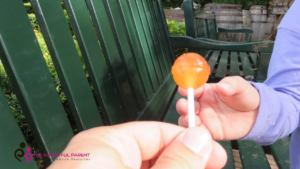 Keeping Kids Safe From Offenders[/caption]
Keeping Kids Safe From Offenders[/caption]
But let’s begin with arming your child with tools for strangers first. Besides the tips already mentioned, ensure that your child understands that some predators will lure your child in with things they know they love. For example, Do you want to see my puppy? Roleplay with your child how they will react to strangers who try and entice them. Also, ask your child if they know your address and phone number. Make sure that this information is memorized and that your child can spill out this information effortlessly and on-demand. Teach your child to step away from vehicles that pull up beside them, even if the driver looks lost or asks for help. Tell your tween or teenager not to walk and text at the same time. Walking with their head down makes them a target. Adolescents need to be aware of their environment, who, where, and what is around them.
Now let’s talk about some tips for keeping your child safe around someone they know. Unfortunately, this is more likely to be the scenario you fear. First of all, teaching your child to blindly obey authority can be detrimental to your child’s safety. Abductors and offenders will prey on easy targets first. That means that if you have a child who is taught to do whatever they are told, despite being uncomfortable, sad, or hurt, you also have a child who is more susceptible to being victimized. As a parent, you don’t want to say things like “Be good and do what they tell you,” or “don’t question Uncle XXX, be respectful.” Although you may mean well and just want to teach your child respect for elders, this can set your child up for dangerous situations. Instead, teach your child to cooperate with adults but report anything that makes them feel uneasy. It’s important that your child feels like they can come to you for help and clarification. Sometimes perpetrators start small to test the waters and see what the child will allow. Your child needs to be able to come to you to clarify their confusion and weird feelings without the fear that you will freak out or not believe them. This is important.
[caption id="attachment_4366" align="alignright" width="300"] Keeping Kids Safe From Offenders[/caption]
Keeping Kids Safe From Offenders[/caption]
Another thing you can do is teach your child how to say no. I know what you’re thinking. My child already knows how to say no. But saying no to you isn’t the same as saying no to a stranger or saying no to a person they trust, like an uncle, a teacher, or a friend at school. They need to practice this aloud and use their body to reinforce the message that they mean no. Roleplay how to say no with not only their words but with their whole body.
[caption id="attachment_4365" align="alignleft" width="300"]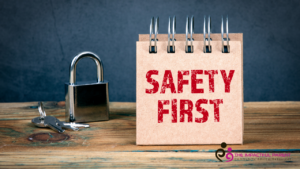 Keeping Kids Safe From Offenders[/caption]
Keeping Kids Safe From Offenders[/caption]
Of course, it is good to know who lives in your neighborhood and check the sex offender registry.
Teach your child about appropriate and inappropriate touch.
Always get a good background check with anyone you leave your kids with.
Educate your child about the dangers of talking to strangers online and meeting up with people they don’t know. This is especially important for teens and kids using dating apps.
I also suggest making sure that your child always has a way to get ahold of you and for you to know their location. This can be done easily through cell phone GPS features. My own children wear GABB watches/phones. These devices are great for the tween years when you want to keep the lines of communication open with your child, but you don’t want them online. Gabb watches and phones don’t have apps, internet, or games. But they do have GPS and are good working phones. To learn more about Gabb phones and watches, go to: www.gabbwireless.com/promo/IMPACTFUL30
I know this is only a taste of how to keep your child safe. Mainly, I wanted to make you aware that kids don’t inherently know any of today's skills. They must be taught by us, the parents. They must be practiced so they can be instilled into their automatic brain. They must be repeated often so that safety procedures are second nature. So talk to your child and make sure they are armed with the tools they need.
For more tips for child safety, watch this video here: https://www.youtube.com/watch?v=_jY1wj2J4fo&t=106s
But until next time, parents, you got this. I am just here to help.
---------------------------
It takes a lot to run a business and family! Here are a few products I recommend:
Gabb Wireless: The BEST first phone for your child!
- No internet, no social media, and NO WORRIES! This phone has GPS tracking and other features that parents want to have peace of mind about their child having a phone. The Gabb Wireless phone has the sleek look of a smartphone that kids love without worry and high price. To find out more and order your phone (or watch) go to: gabbwireless.com/promo/IMPACTFULPARENT30
The Contract Shop
- Protect your contact and your business with the Contract Shop. The Contract Shop provides DIY legal contracts that you customize for your business and your business needs. Contracts are important and legal documents are boring! The Contract Shop provides the security you need without the big price tags of an expensive law firm. Try it out today and please use my affiliate link for referring you because I get a small kickback for recommending The Contract Shop products. Here is your link: https://thecontractshop.com?ref=kristinacampos
Mobile Monkey
- Mobile Monkey helps you gain more engagement in your social media posts by providing you with a ROBOT to client questions in your DM. This bot is genius and saves so much time! Use your robot to respond to common questions, to create keywords your audience can type in order to receive special links, get analytics, auto-responses and so much MORE! Mobile Monkey should be helping every content creator’s business because at this low price- there are no excuses for getting more time, ease in your business, and increased engagement! Please use my affiliate link to order: https://app.mobilemonkey.com/instachamp?a_aid=kristinaann